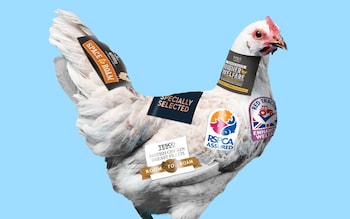Most people in Britain, in cities and large towns especially, frequent their corner shops for little more than a pint of milk or packet of bacon. But some in rural pockets across the country call on their local vendors for much, much more than this.
Across the country there are very special shops that provide a lifeline to locals and visitors alike. They act as hubs for their communities, with staff that go well above and beyond the remit of any ordinary shopkeeper.
At a time when rural communities and even large villages are losing their banks, post offices, pubs, shops and bus routes – of which there was a loss of 20 per cent last year – such local shops often become crucial to small communities that would struggle to get their needs met if they weren’t there.
There can be no better example of this than the finalists of this year’s Countryside Alliance Village Shop awards, sometimes called the “rural Oscars”, which is sponsored by The Telegraph.
Each of the shops below has been voted a regional winner and is now in competition for the national title, to be announced at the House of Lords on June 25. Here they explain what they do for their local communities and just what it is that makes their businesses so special.
Garboldisham Village Store and PO
Ten years ago Robbie Starling, 57, and his wife Kelly were set to relocate from London to Botswana for their jobs with diamond companies. “But one day she just woke up and said, let’s sell the house, get out of the rat race and buy a small business,” Robbie says.
That’s how the couple and their two children ended up relocating to the Norfolk village of Garboldisham, in January 2014. The previous owners of the Garboldisham Village Store had been slightly lacking in their approach to its management so on the family’s first day of trading “it was heaving,” Robbie says. “Everyone was keen to come in and see who this couple from the diamond world in London were.”

The village shop sells everything you could ever need, Robbie says, and a large amount of it is sourced from local suppliers. There’s bread, cakes, brownies and Portuguese tarts from three different village bakeries, beers brewed within three miles of the outlet and fish caught fresh on the Suffolk coast. Then there’s a “second-hand bookshop, and a card room where local artists can show their work,” Robbie says.
It’s no wonder then that the shop has become “the hub of the village” as Robbie puts it. He supplies the local pub with apple juice and the local church with food for its foodbank, and knows almost everyone in the village by first name. Not only this, but the Garboldisham shop’s Post Office provides a “full banking service as well as postal service” in an area where in-person banking is harder to access than ever.

If that wasn’t enough, the shop has become something of a destination for those in neighbouring villages too “as we sell a lot of artisan products” and at the weekends there’s a barista coffee pop-up “with artisan coffee, entry level coffees and cheaper coffee too” – something for everyone.
Does Robbie miss the London rat race? “After working in quite an intense corporate world and commuting every day, my stress levels were through the roof, and I’d always get this feeling of dread going to work on a Sunday night,” he says.
“With this job I never get that – I spring up and opening the shop is a delight and my working life is bliss. There’s more time for us as a family too, to have breakfast together and see each other for dinner every day.”
Fittleworth Village Stores
In name, Toni Humphrey, 45, is the manager of Fittleworth Village Stores in the South Downs. In reality though, she has a much bigger role in the local community.
“We really go above and beyond to help our customers, who are almost all from the local area,” Toni says. “We’ve had situations where one of our customers has fallen over and their carers can’t get to them, so we’ve stepped in to help – if one of our locals needs help then all they need to do is ring and we’ll do as much as we can,” she says.

Unlike most shops, Fittleworth Village Stores is owned by its customers, with a committee management board of seven people, eight paid staff, manager Toni and some 35 other volunteers.
“It all started with a local meeting where one of our residents said that we needed a local shop, as the one that had been here closed five years ago before this one started up,” Toni says. “They then did a lot of fundraising from local people who gave money and grants.”
It was then that Toni came across an advert for an assistant manager on social media, becoming manager five months later. “I love everything about my job,” Toni says. “There’s always a lot of work to do but it’s so worth it and I have an amazing team – it’s such a warm, homely place.”
Since the shop opened in October 2018 “we’ve tried to get as much local produce as we can find, and we have a map on our website of local suppliers and a table at the front where people can see new things – everything from ceramics to meat and juices,” she says.

Now Fittleworth Stores even has its own cafe and post office. “Originally the cafe could fit 15 but we’ve extended it to fit 80 in the summer,” says Toni.
The shop has been transformed by the needs of locals over the years, Toni says, but so too has it changed Fittleworth village. “When we started up we had people who’d lived in the village for 20, 30 years and never met before bumping into each other at the shop, and especially during Covid people got to chatting to each other in the long queues.”
It was then, during the pandemic, that people “realised we were here”, Toni says. Because of the shop’s connections to local suppliers “we could get in things the supermarkets couldn’t, like loo roll and eggs”. Fittleworth Food Angels, set up to help those struggling then, still continues to provide weekly free food boxes. These days “people still come in all the time just for a coffee and a chat”.
Child Okeford Village Shop
Since the beginning of Andrew Stevenson-Hamilton’s involvement with Child Okeford’s Village Shop it has always been a family venture. Andrew relocated to Child Okeford in Dorset with his daughter and stepson from Scotland, in 2016, after he was widowed. His daughter picked up a Saturday job at the shop as it was then.
“Then in 2019 the shop came up for sale, and I thought it would be the perfect time to get involved in the community and start over again,” Andrew, now 59, says.

Andrew had enormous respect for the shop’s previous owner but “it did need modernising,” he says. “We had a huge refit in 2021, where we gutted the place and its floor area and now it’s 1,500 sqft rather than 1,000, and we’ve put in a range of wine and fresh food, and new lighting too.”
Though fitting in in quaint Dorset, the shop is certainly modern. It now has an in-house bakery “that does croissants and bread in the morning, and pastries and sausage rolls later for the village workman”, Andrew says. Then there’s the weekly trip to one of the shop’s 20 local suppliers, which becomes a minute-long clip shared on the shop’s Instagram page – this week, it’s locally-made artisan chocolate.

The shop sponsors the local school football team, makes food deliveries for those who struggle to shop, provides its local church with flowers and its village fete with a stall.l
“The main thing is that anything anyone wants we try to stock,” Andrew says.
It’s been a roaring success: the shop is a busy centre of activity in an area where there are “probably more dogs than humans”. But the shop’s start was not an easy one. “We opened a week into lockdown,” Andrew says. “Though it was tough it was also a great chance to show what we could do for the local community, in terms of providing food orders to houses.
“With little else open it was a chance to meet customers at an accelerated rate and build a relationship with them,” the shopkeeper says.

Andrew and his team of 16, recruited from the local area, are all about getting out and serving their own village as well as neighbouring ones – the shop runs its own mobile postal service for Child Okeford and the seven surrounding villages out of the back of a car, as their postal services “shut down some time ago”.
“I never knew what it was to serve until I did this job,” says Andrew. “You can immediately see that you’re giving something to someone and it just livens your day.”
Muasdale Stores
Muasdale Stores, in remotest Argyll, is “a bit of an oasis”, according to its owner Will Anderson Jones, 48.
“It’s in the heart of Kintyre [peninsula], bang in the centre on a main road, and our shop’s on the beachside overlooking the water on to the different islands on the west coast,” Will says. “Most of our customers are locals travelling the road for work or golfing, looking for something to eat or drink. Other times they want a bit of a break or a chat, which we’re always on hand for.”
Nearby there’s “a church a couple miles away and in the next village along there’s a community hall, but other than that it’s really just ourselves, so we’re probably pretty vital to the area.”

Muasdale Stores had been owned by the same family since 1960, before it closed in 2016 and was sold to an artist, who turned it into an art gallery – though she had to put the building back up for sale in 2019. “My partner Stephen and I were taking the dogs for a walk on the beach and passed by and saw the for sale sign,” says Will.
“I had just quit my job at the local golf course at the time, and I’d always wanted to own my own store, so we popped in and we’ve never looked back.”
These days what makes Muasdale Stores unique, aside from its location, is that “we cater for everybody,” Will says. “We’ve got everyday supermarket products but premium products too, and then fresh coffee and sandwiches, soup every day and hot rolls towards the end of the week.”

That’s just the food offering – “we’ve got a great selection of gifts, toys, homewear, beautiful cards,” says Will. “People are always amazed when they come into the store and see the array of what we offer, and we’re always looking for new things to add.”
Like his competitors, Will too goes above and beyond for his customers, but life in such a rural area calls him to take on slightly stranger tasks.
“The other week there were cows on the road just outside the village, so I had various people phoning me asking me to do something about it,” Will says. “I do know the farmer who owned the cows but he wasn’t accessible, but luckily I know another farmer who could come and secure the cows.”
A typical day in the life of this shopkeeper.
“I do like to care for and look after people, and make people happy in the store as well, and entertain and have a bit of banter,” he says. “And I’m probably a bit of a feeder too,” says Will, “always giving people bigger portions than I should.”
Disclaimer: The copyright of this article belongs to the original author. Reposting this article is solely for the purpose of information dissemination and does not constitute any investment advice. If there is any infringement, please contact us immediately. We will make corrections or deletions as necessary. Thank you.



